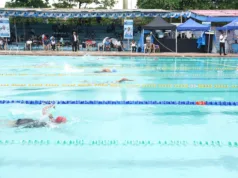The ongoing 24th National Para-Swimming Championships Goa 2024, showcases over 500 of India’s top para-athletes. Among the competitors are four para-swimmers from Goa. These athletes have overcome significant challenges to secure their place in the competition, demonstrating remarkable resilience. Despite facing adversity, their determination, supported by the unwavering encouragement of their loved ones, has empowered them to defy the odds and rise to the occasion.
The S9 category is designated for swimmers with mild physical impairments, such as weakness in a limb or restricted movement, enabling them to execute swimming techniques effectively while still navigating physical challenges. Competing in this category are Goan Para-swimmers Melvin Mendes, Mangesh Shankar Kuttikar and Sheron Figarado.
Melvin Mendes, 24, began his journey in para-sports with badminton before finding his true passion in swimming. His competitive swimming career took off in 2022, driven by his deep love for the water. Recently, Melvin secured gold medals in both the 50 metres and 100 metres freestyle at the State Para-Swimming Championships, earning him a spot at the national event. Expressing gratitude for the experience as he competes against athletes from other states, Mendes says: “You just have to get out of the house and explore what you want just once to understand the path ahead”. He hopes that through his performance here at the National Championships and with the huge participation persons with disabilities may get inspired to take up para-sports.
Mangesh Shankar Kuttikar, 54, is a pioneer in Goa’s para-swimming community. Since beginning his journey in 1993, he has reached numerous milestones, including representing India on the international stage. Mangesh is particularly renowned for being the first person with a disability in India to swim 10 kilometers blindfolded with his hands tied. He attributes his success to self-learning and unwavering determination. Reflecting on his path, he says, “The journey has not been easy, but determination and self-learning have brought me this far.” Mangesh’s accomplishments continue to inspire others, demonstrating that resilience can lead to extraordinary achievements.
Sheron Figarado, 41, an associate professor at IIT Goa, started swimming in 2018 and ventured into competitive para-swimming in 2021. Since then, he has dedicated himself to honing his skills, with a particular focus on breaststroke events. Sharon credits his coach, Keshav Naik, for helping him refine his technique and expresses gratitude to his colleagues and staff at IIT for their unwavering support. While he values the backing of local training facilities, he hopes for more resources in the future. “There is greater awareness about para-swimming now, and I believe we should encourage our neighbors and friends to get involved. My goal is to qualify for international events in the near future,” he says.
The S14 category is for athletes with intellectual impairments, where cognitive function may affect decision-making or reaction times but does not significantly affect physical movement.
In the S14 category, 20-year-old Harshad Satish Sawant has been a dedicated para-swimmer for nearly five years. Encouraged by his teacher, he embraced competitive swimming while managing his studies at New Dawn Ashadeep. Beyond the pool, Harshad is also passionate about dancing and painting. “I enjoy competing in various events, and swimming has provided me with an opportunity to excel in sports,” he says. With his sights set on a gold medal in the S14 category, Harshad is hopeful that his determination and diverse talents will lead him to victory.
The 24th National Para Swimming Championships provides a vital platform for para-swimmers to showcase their talents and advance in their sporting careers. This event aims to foster inclusivity and raise awareness about the abilities of individuals with disabilities while promoting Paralympic sports. With participation from 28 states, the championships not only celebrate the athletes’ commitment but also highlights the significance of community support in nurturing a culture of inclusivity in sports.






